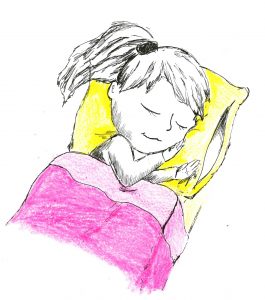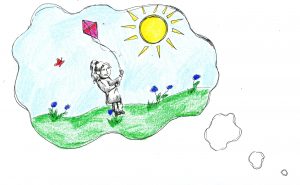
Author: Layal Bou Abdo MSN
Illustration: Angeline Boswell
Dreams can help you; they can haunt you or they can just be… really really weird! But have you ever stopped and wondered why do we dream?
Going to sleep is like when you put your computer on a sleep mode without fully turning it off. The computer will keep working but not as hard as it is when it’s on. You will recharge it while saving its energy. As you sleep, your brain will turn itself into a sleep mode, it is resting, recharging but it never stops working.
Dreams are like a movie going on inside your head!
Why are dreams important to us?
Scientists still don’t fully understand where dreams come from, but they know that dreaming has a lot of benefits.
When you are dreaming, some parts of your brain are switched on and working hard, like things that you saw today, your imagination, your logic, your feelings and complicated things.
Dreaming is like imagining stuff when you are sleeping, so dreams come from your imagination; they make you more creative. This is the moment when your imagination can go crazy.
Researchers have found that we tend to dream about common stuff that happens with us, like playing with a friend or for example about important stuff to us like going to a party. Stuff that we are really excited and thinking about.
Dreams might also make you smarter during your waking hours, dreams might help you remember stuff better when you are awake. Over the course of the day, you’re hearing and seeing and smelling millions of things around you. When you sleep, your brain will store the most important things in your memory and connect them with things you learned before. So, dreams improve your memory while making you remember things for years.
Studies suggest that dreams help us solve problems. Have you ever dreamed about doing your science test at school the night before your test? It’s like your brain is repeating what you studied for your test.
Let’s assume you are learning how to ride a bicycle; you had a dream about riding. Maybe you tried different ways in your dreams, you trained on balancing and pedalling. It’s the way your brain is practicing when you are asleep. When you wake up the next day, you might feel more confident or you might have new ideas about how to be a better biker. Don’t forget to ride safely!
We also need dreams to help us sort the feelings that we had during the day to help us cope with painful memories. If you were scared or worried about something you might have a dream about being scared of a different thing, to help you work out how you feel. That might help you to be more prepared to tackle what you were worried about the next morning.
Other scientists don’t think that dreams are related to memories or feelings at all! During the REM stage of sleep (explained below), certain circuits in the brain get activated. When the brain tries to synthesize and make sense of these signals, it results in dreams.
Stages of sleep
When you sleep each night, you take a roller coaster ride through different phases of sleep every 90 min until you wake up.
There are two categories of sleep.
- Non-rapid eye movement: your eyes remain still (stage 1-4)
- Rapid eye movement: your eyes move rapidly under your eyelids (Stage R)
Those categories together make a cycle, where your brain cycles into 6 stages of sleep.
-
- Stage 0: Wake. it’s the time you spend in bed before and after you fall asleep. It also includes a brief awakening during the night.
- Stage 1 & 2: Light sleep. This stage lasts around 20 min. This is when your sleep cycle starts and acts as a passage to the deeper sleep stage. You might feel that you are still awake even if you are dozing off. During this phase, your muscles relax, your respiration slows, your heart rate decreases and your body temperature drops.
- Stage 4 & 5: Deep Sleep. This stage is essential for your body as it promotes your muscle growth and repair. It also helps your brain recharge and cleans up all the waste. In this stage, it will be difficult to wake you up and if you got awoken, you will be confused and disoriented. During this phase, your blood pressure drops, the blood flow increases to your muscles, your body releases the repair hormones and your brain flushes out the waste. You might have few dreams perhaps about what you were doing during the day.
This is why sleeping is so important for your body.
-
- Stage R: REM Sleep. This is the stage when your mind recharges its energy, and this is the stage associated with dreaming. During this stage, your respiration and heart rate increase, your brain activity is high, your body is still and the epic movie-like dreams; the ones that you will remember best in the morning.
Your body repeats these cycles about four to five times each night.
Common dream themes
- What does it mean when I dream about flying?
You are extremely happy and feeling that you can accomplish anything! It’s a feeling of independence or freedom. Enjoy your ride!
- What does it mean when I dream about falling?
You are nervous, worried or losing control. Did you prepare well for your next math test?
- What does it mean when I dream about appearing naked in public?
You feel vulnerable or exposed. Did you tell a lie? Did you overshare personal information?
- What does it mean when I dream about finding new rooms at home?
You are excited about new or unexpected opportunities in your life.
- What does it mean when I dream about getting chased by something or someone?
You are putting off some unpleasant task or approaching a big deadline. It could suggest that something is trying to catch up with you. Often, it’s related to how you’re feeling about some difficult part of your life that you’d prefer to avoid: perhaps an unrecognized trauma, a stressful event, or something you fear.
Fun facts:
Did you know that?
- All mammals experience REM sleep and so do some birds.
- Many scientists, artists and writers got inspired by their dreams, many inventions that changed the world were inspired by dreams: Google, the sewing machine, the Theory of Relativity of Albert Einstein’s, the DNA, the Periodic Table, the Structure of the Atom, The Persistence of memory of the famous painter Salvador Dali are some examples.
- We spend a third of our life asleep.
- You can usually tell that someone is dreaming because their eyes are moving rapidly underneath their closed eyelid.
- Most dreams last about 10 -20 min at a time.
- A “sleep study” is also called Polysomnography. It is an overnight test used to diagnose sleep problems. Polysomnography records a variety of body functions while you are asleep. During a sleep study, doctors check:
- eye movements
- heart rate
- breathing patterns
- brain waves (EEG)
- blood oxygen level
- carbon dioxide levels
- snoring and other noises
- body movements and sleep positions
Since Dreams are like a movie, we prepared a projector for your phone as the craft related to this topic.
We are certain your kid asks you health (human & animal) questions that genuinely leave you stumped! Leave a comment below and we are happy to answer “why” in future blogs.
Copyright © 2021 Little Medical School Ottawa


